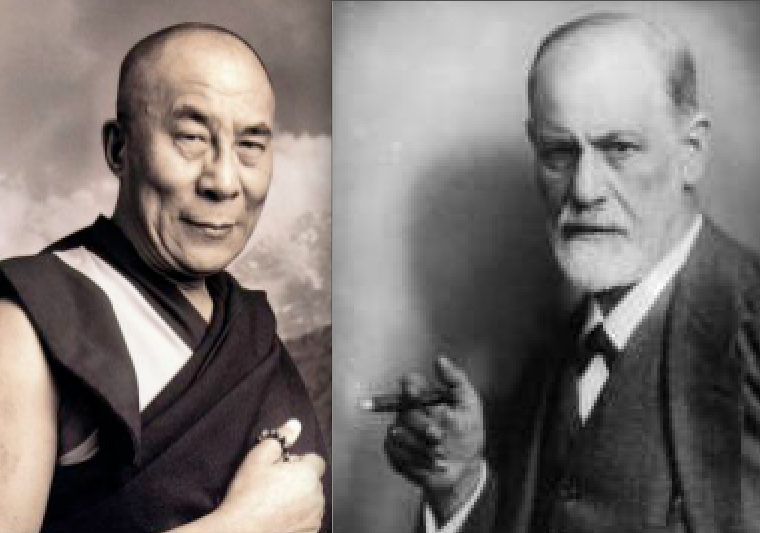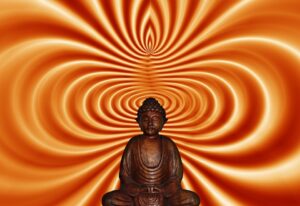Modern Western Psychology (our entire paradigm of analyzing the “unconscious mind”) is based on the idea that through thinking, analyzing, and understanding, we can treat and cure the disorders of the mind. The problem is that most of the disorders that we attempt to treat through thinking and analyzing are arising from that very thing: thinking, and analyzing!
Our Current Psychiatric Paradigm is Inherently Flawed
Modern Western Psychology (our entire paradigm of analyzing the “unconscious mind”) is based on the idea that through thinking, analyzing, and understanding, we can treat and cure the disorders of the mind.
The problem is that most of the disorders that we attempt to treat through thinking and analyzing are arising from that very thing: thinking, and analyzing!
The thinking process itself is not inherently a “problem.” We evolved the ability to think in order to solve problems, plan for the future, and work together more effectively through communication. Thinking is a very useful tool.
The problem comes when we are not skilled in using that tool. Nuclear power is also a very powerful tool, but if you don’t know how to use it, it can destroy you.
We untrained humans misuse our minds in many and various ways. We develop unhealthy thought-habits by constantly revisiting thoughts about painful, useless, or counterproductive things. We constantly think about potential problems, and make ourselves neurotic. We constantly think about potential gains, and make ourselves manic. We think too much and burn out our brains, and make ourselves depressed.
The root cause of the mental problems running rampant in Western Society today is this: we place too much attention on our thoughts.
I believe that our current Western Psychological Paradigm has actually made this problem much, much worse over the past century.
Popularized by people like Sigmund Freud, the importance of the “Unconscious Mind” is now common knowledge. Freud & Friends spurred a movement toward “psychoanalysis,” or “analyzing the mind” in order to dive down into the Unconscious and drag the hidden things back up into the light.
Psychoanalysis is a process of holding on to particular thoughts, and analyzing them intensely. Freud saw the thoughts arising in the conscious mind as keys to the Unconscious… threads that could be followed down, down, down into the depths of consciousness.
This psychoanalytical paradigm has created massive psychic waves in our society by changing the way millions of people look at their minds.
Freud placed a great deal of importance, and thus a great deal of attention, on a person’s thoughts. He spread the understanding that your thoughts (conscious and unconscious) are responsible for your actions, and are thus, essentially, responsible for “who you are.”
Thus, our modern paradigm of psychology here in the western world causes people to identify with their thoughts. They see “themselves” and “their thoughts” as inextricably intertwined. Since people tend to place a great deal of importance on themselves, they are now placing greater and greater importance on their thoughts, and giving them a significant amount of their attention.
Everyone has a limited amount of attention. No one can be focused on everything at once. In the olden days, people focused on the practicalities of life. They focused on things like building houses, growing food, hunting, etc. Their attention rested in the physical world around them.
Now, however, due to the increasing popularity of the psychoanalytical paradigm and the idea that “you are your thoughts,” our collective attention is turning more and more inward. Our attention is becoming more and more wrapped up in the thought-world.
While on the surface this might seem like a good thing, this phenomenon is the root cause of 99% of the mental problems and psychological disorders in our society.
By turning inward, we live in our own little worlds and distance ourselves from each other. This creates a fundamental sense of selfishness and loneliness, which is currently rampant in our society.
Aside from the obvious social and relational problems that this causes, putting too much importance (and thus too much attention) on our thoughts creates the following problems within our own minds:
• Depression
• Mania
• Anxiety
• ADD / ADHD
• Confusion
• Narcissism
This thought-oriented way of being also creates the following interpersonal problems (among others):
• Selfishness (valuing self above others)
• Fear
• Anger
• Hatred
• Violence
• Wars (on a macro scale)
This list of disorders accounts for more than 80% of the clinically diagnosed psychiatric patients in Europe & North America. All of these people could be cured through the simple act of learning and practicing the art of meditation.
In order to effectively treat this huge portion of the population, we must make some minor changes to our current model of mental health treatment.
1. All new Mental Health Professionals should complete at least two semesters of meditation, plus at least one intensive 10-day retreat, before receiving their degrees and licenses. This one single change should create a very powerful paradigm shift in the next generation of psychiatric treatment.
2. Meditation courses should be prescribed — before medication — as the first-line treatment for “thinking” based disorders like depression, mania, anxiety, ADD/ADHD, and all of the other psychological issues mentioned here.
If you want proof that the Eastern Psychological Paradigm works better than the Western Psychological Paradigm, look at the faces of the central figures.
Key Figures in Western Psychology
Key Figures In Eastern Psychology
What do you think? Were the founders of the western psychological paradigm happy? Are the leaders of the eastern psychological paradigm happy? What do you think their lives were like? Whose advice would you take on how to be happy… the guy with the big happy smile or the guy who looks like he wants to kill himself?

















I think there’s some truth to this.
Some.
But at the same time it seems kind of blanketed. I suppose it’s possible that psychoanalysis-digging deep, probing the “why’s” of one’s actions-has never helped anyone, in truth. But this seems unlikely.
I’d say the same for medication.
My panic started early on. Induced by, I’m guessing, the conflict within in my mind of my Christian beliefs(formerly) and my desire to sleep with members of the same sex. And in my experience it’s definitely true that during some of those moments of panic the most comforting thing was prayer paired with music. Which looking back seems like a form of meditation.
But I wasn’t in a place where I could accept that THAT itself could be the “cure” for my panic.
It was seeing someone else go through an anxiety attack, watching from the outside, that I could distance myself and have a more clear vision of what was going on by analyzing it. Then in turn applying that to my own situation.
Understanding my fear, that it was indeed coming from my mind, was very helpful to me and others.
Early on I decided against taking medication. This was somewhat out of pride. Thinking, “I can beat this”. And I didn’t want to be dependent.
About 10 years later I went through some depression and spent 2-3 years on Lexapro at the referral of a friend. At this point I was ready to try it. With the intention that it would be used like a crutch after an injury.
Like, I believe, any drug does, it showed me potential. Ways in which I could react differently to a situation. But I will emphasize that it also took conscious effort to form those new mental habits. Kind of like physical rehabilitation. If you don’t do the exercises you won’t fully recover.
Nowadays, meditation is pretty much my number one go to if I find myself waking up in a panic. I understand that, like a wave on the ocean, this emotion will pass. So the best option is either dive into it or pick up my feet. Which in practicality means, lying down, and focusing on my breath. Meditation.
However, if I’m having frequent anxiety, for me that’s a sign that there may be something going on that may need addressing. But that’s to be done in a journal or conversation with someone who can help me organize my thoughts and, again, get a clearer picture of my own mental landscape.
This isn’t an argument against what you say because we seem to agree that it’s not that thinking is bad. But that, like anything else, it can be handled improperly. Much like a car. Or words.
The way I see it, thinking, analysis, can be very valuable. This, to me, is the essence of Plato, Epictetus, Marcus Aurelius, Seneca and other western philosophers. Almost using thought as a weapon against itself and it’s own destructive power.
I see these two, mediation and analysis, almost like a sword and a shield. Each with their proper uses.
Finally, I think it may be unfair to use those two photos as characterizations of Eastern and Western psychology. These are snapshots, brief moments, of the lives of 2 individuals.
Not to mention that in one of the photos the individual is unaware that he is being photographed and in the other it’s the opposite.
I imagine I could find a picture of the Dalai Lama NOT with smile and that other guy(I don’t know who that is so I’ll just call him that other guy) smiling.
All that aside, thank you for sharing this. I found it inspiring and helpful. 🙂
Hi Chris, thanks for your thoughtful reply 🙂 I do have a habit of painting things with broad strokes sometimes, so thanks for bringing some nuance to the conversation.
PS – “the other guy” is Sigmund Freud 🙂 and if you Google his name you’ll see he’s not very smiley in most pics. Opposite for dalai lama. For what it’s worth, I’m in India right now at Amma’s ashram and everyone here is super smiley 🙂
Namaste brother.
… [Trackback]
[…] Here you can find 79162 additional Info to that Topic: meditationmag.com/blog/our-current-psychiatric-paradigm-is-inherently-flawed/ […]
… [Trackback]
[…] Read More Info here to that Topic: meditationmag.com/blog/our-current-psychiatric-paradigm-is-inherently-flawed/ […]
… [Trackback]
[…] Info to that Topic: meditationmag.com/blog/our-current-psychiatric-paradigm-is-inherently-flawed/ […]
… [Trackback]
[…] Read More on on that Topic: meditationmag.com/blog/our-current-psychiatric-paradigm-is-inherently-flawed/ […]
… [Trackback]
[…] Read More to that Topic: meditationmag.com/blog/our-current-psychiatric-paradigm-is-inherently-flawed/ […]
… [Trackback]
[…] Read More to that Topic: meditationmag.com/blog/our-current-psychiatric-paradigm-is-inherently-flawed/ […]
… [Trackback]
[…] There you can find 22240 additional Info to that Topic: meditationmag.com/blog/our-current-psychiatric-paradigm-is-inherently-flawed/ […]
… [Trackback]
[…] Find More on that Topic: meditationmag.com/blog/our-current-psychiatric-paradigm-is-inherently-flawed/ […]
… [Trackback]
[…] Here you will find 58047 additional Information on that Topic: meditationmag.com/blog/our-current-psychiatric-paradigm-is-inherently-flawed/ […]
… [Trackback]
[…] Information on that Topic: meditationmag.com/blog/our-current-psychiatric-paradigm-is-inherently-flawed/ […]
… [Trackback]
[…] Find More on to that Topic: meditationmag.com/blog/our-current-psychiatric-paradigm-is-inherently-flawed/ […]
… [Trackback]
[…] There you will find 24069 additional Info on that Topic: meditationmag.com/blog/our-current-psychiatric-paradigm-is-inherently-flawed/ […]
… [Trackback]
[…] Find More to that Topic: meditationmag.com/blog/our-current-psychiatric-paradigm-is-inherently-flawed/ […]
… [Trackback]
[…] Find More here to that Topic: meditationmag.com/blog/our-current-psychiatric-paradigm-is-inherently-flawed/ […]
… [Trackback]
[…] Find More here on that Topic: meditationmag.com/blog/our-current-psychiatric-paradigm-is-inherently-flawed/ […]
… [Trackback]
[…] Here you can find 49312 more Info to that Topic: meditationmag.com/blog/our-current-psychiatric-paradigm-is-inherently-flawed/ […]
… [Trackback]
[…] Read More on to that Topic: meditationmag.com/blog/our-current-psychiatric-paradigm-is-inherently-flawed/ […]
… [Trackback]
[…] Here you can find 79822 additional Info to that Topic: meditationmag.com/blog/our-current-psychiatric-paradigm-is-inherently-flawed/ […]
… [Trackback]
[…] Find More on on that Topic: meditationmag.com/blog/our-current-psychiatric-paradigm-is-inherently-flawed/ […]
… [Trackback]
[…] Read More Information here on that Topic: meditationmag.com/blog/our-current-psychiatric-paradigm-is-inherently-flawed/ […]
… [Trackback]
[…] Here you can find 27213 additional Info on that Topic: meditationmag.com/blog/our-current-psychiatric-paradigm-is-inherently-flawed/ […]
… [Trackback]
[…] Read More on to that Topic: meditationmag.com/blog/our-current-psychiatric-paradigm-is-inherently-flawed/ […]
… [Trackback]
[…] Info to that Topic: meditationmag.com/blog/our-current-psychiatric-paradigm-is-inherently-flawed/ […]
… [Trackback]
[…] Find More here on that Topic: meditationmag.com/blog/our-current-psychiatric-paradigm-is-inherently-flawed/ […]
… [Trackback]
[…] Info on that Topic: meditationmag.com/blog/our-current-psychiatric-paradigm-is-inherently-flawed/ […]
… [Trackback]
[…] There you will find 38628 more Information on that Topic: meditationmag.com/blog/our-current-psychiatric-paradigm-is-inherently-flawed/ […]